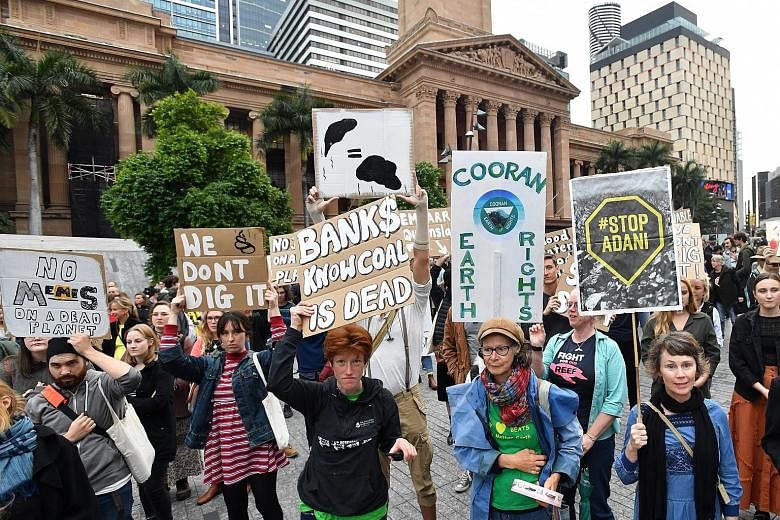A vast stretch of dry brown land in a remote region of north-east Australia marks the proposed location of one of the most controversial development projects in the nation's recent history.
This rural spot, about 1,100km from Brisbane in Queensland, is the site of the Carmichael coal mine, which contains billions of tonnes of thermal coal and marks potentially one of the biggest such mines in the world.
For almost a decade, Indian mining giant Adani Group has been seeking to develop the mine, with plans to build a 200km rail line to connect it to port facilities on the Queensland coast. Most of the coal is expected to be shipped to India to fuel its growing demand for energy.
But the estimated A$4 billion (S$3.8 billion) project has been mired in controversy and prompted a nationwide debate that helped to decide the outcome of the recent Australian election.
The mine has been fiercely condemned by environmental campaigners, who say the coal's emissions will significantly affect the global effort to tackle climate change. These climate concerns prompted Australia's four main banks to refuse to fund the project, forcing Adani to do so itself.
Yet it seems the massive project is set to finally win approval.
The Queensland government last month approved Adani's plan to protect an endangered small bird affected by the mine.
This paved the way for the project to clear its last hurdle and receive approval for its plan to protect local groundwater supplies and springs. The state government gave itself a deadline of this coming Thursday to approve the water plan. Following this, according to Adani, construction of the mine and railway would begin within days.
Queensland's Labor government rushed to finalise the mine's approvals after voters in the region sent a strong signal at the federal election on May 18 that they wanted the project to proceed. "The federal election was definitely a wake-up call to everyone," Queensland Premier Annastacia Palaszczuk told reporters four days after the election. "I hear that message."
Queensland voters, many of whom believe the project will boost the state's economy, heavily supported the federal coalition, which has firmly backed the mine.
In contrast, Labor, which favours stronger carbon emission reduction targets, was seen as less committed to the mine. Labor's stance led to a heavy loss of support in Queensland, where it won just six out of 30 federal seats. This result made it almost impossible to win a majority in the nation's 151-seat Lower House.
Outside Queensland and mining regions, and particularly in inner-city areas, the project was deeply unpopular. Opinion surveys have typically found more people across the country opposing the mine than supporting it.
But the mine now seems likely to proceed, although environmental groups say they will not abandon their hard-fought "Stop Adani" campaign, including pursuing legal challenges. The Australian Conservation Foundation says the project will destroy wildlife and water and is a "climate crime".
"If it goes ahead, Adani's mine and its coal will wreck our climate, steal our groundwater, trash indigenous rights and irreversibly damage the Great Barrier Reef," the organisation says on its website.
Adani has already scaled back its initial plans for the mine. It is building a much smaller rail link than its original plan for a 388km line, and has reduced its proposed volumes for the mine. Last year, it said the mine would start by producing about 10 million tonnes of coal a year and "ramp up" to an output of 27.5 million tonnes a year. It was originally expected to produce up to 60 million tonnes a year.
The project is due to produce 1,500 jobs, though the federal government believes another 5,500 jobs will be created indirectly, including in local housing, food and support services.
Adani says the reduction of the project's size has lessened the risk and made it more viable.
But some analysts have questioned the mine's long-term economic viability. Professor John Quiggin from the University of Queensland said he believed global moves away from coal-fired power plants will significantly affect demand for coal. He suggested Indian tycoon Gautam Adani may eventually decide the venture is not worth pursuing, though this could lead to the government providing funding.
"With an estimated wealth of US$7 billion (S$9.5 billion), he can certainly afford to pay if he chooses to," he wrote on The Conversation website last Monday. "But it would represent a huge bet on the long-term future of coal-fired electricity, at very bad odds."

